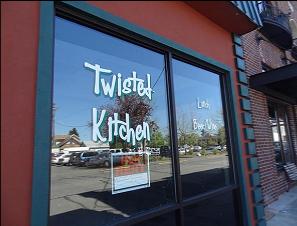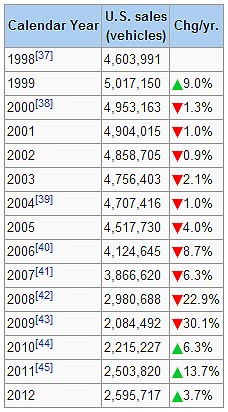2008-2013:
The Numbers Tell the Story
The Numbers Tell the Story

During this period of economic turmoil, one Enumclaw mainstay for many families has been Plateau Outreach Ministries (P.O.M.). Offering rent and utilities assistance, a weekly food bank, and other kinds of emergency help, the mostly volunteer organization has been a lifeline to countless local residents in times of need. The organization's primary sources of income are donations and their thrift store, More Pennies from Heaven. Since the economic crash of 2008, they have had a surge in people needing their services, including some who were donors in better times.
In 2011, P.O.M. moved into its fourth and largest location. With donations and an interest-free loan, the organization was able to buy and remodel the large building across the street from the Post Office. In the new facilities, the organization greatly expanded the size of Pennies and the Food Bank, improved the consultation rooms, and even added shower and laundry facilities. This coalition of plateau churches can now offer even more hope to our neighbors in need.
With an economic recovery now in full sway, many in our town have optimism about the future.
In 2011, P.O.M. moved into its fourth and largest location. With donations and an interest-free loan, the organization was able to buy and remodel the large building across the street from the Post Office. In the new facilities, the organization greatly expanded the size of Pennies and the Food Bank, improved the consultation rooms, and even added shower and laundry facilities. This coalition of plateau churches can now offer even more hope to our neighbors in need.
With an economic recovery now in full sway, many in our town have optimism about the future.
Resources
About
Contact
NOTES
1. Enumclaw, Washington. City-Data.com
2. Sales Records. King County Assessor's Office.
3. Foreclosures-Enumclaw. Home Facts.
4. Enumclaw, Washington Unemployment. Home Facts.
5. Cara Solomon. "Nestle water plant? Not in our town, Enumclaw says." The Seattle Times. July 24, 2008.
6. General Motors and Chrysler. Wikipedia.
1. Enumclaw, Washington. City-Data.com
2. Sales Records. King County Assessor's Office.
3. Foreclosures-Enumclaw. Home Facts.
4. Enumclaw, Washington Unemployment. Home Facts.
5. Cara Solomon. "Nestle water plant? Not in our town, Enumclaw says." The Seattle Times. July 24, 2008.
6. General Motors and Chrysler. Wikipedia.

This history chapter is told in the language of numbers, but contained in them are very personal stories of despair and hope. The numbers connect events between Wall Street and Wells Street, between K Street and Cole. Remote as our small town might seem at times, it is tied to global events that altered the lives of people all around us.
The housing bubble burst in 2008, with a dramatic impact on Enumclaw. Prices had been skyrocketing but loans were easy to get. Suddenly the precarious real estate market toppled. The average family's biggest asset was its house, which lost 35% of its value in Enumclaw in a less than a year. That drop, of course, was because no one was buying. Look at the pattern of how many houses sold in Enumclaw before and after the crash, even at drastically reduced prices:
New and Existing Enumclaw House Sales by year:
(for comparison, 526 homes were sold in 1993.)
The housing bubble burst in 2008, with a dramatic impact on Enumclaw. Prices had been skyrocketing but loans were easy to get. Suddenly the precarious real estate market toppled. The average family's biggest asset was its house, which lost 35% of its value in Enumclaw in a less than a year. That drop, of course, was because no one was buying. Look at the pattern of how many houses sold in Enumclaw before and after the crash, even at drastically reduced prices:
New and Existing Enumclaw House Sales by year:
(for comparison, 526 homes were sold in 1993.)
Actually, the collapse was even greater than the figures suggest, since Enumclaw's troubled sewer system forced a decade-long moratorium on new construction, with only a slight bump in 2010 after it was lifted, and a large proportion of those purchases were investors scooping up foreclosed houses the banks were selling at a loss. Even though developers could then build new houses in Enumclaw again, virtually none of them did. Several annexations substantially increased the land area within the city limits for construction and for the inventory of existing homes. Still, the number of houses sold here in 2012 was the lowest of the past 20 years, less than half of what it was in 1993. (2) The median home selling price here dropped from a high of $350,000 at the end of 2007 to $245,000 by the end of 2012. (1)
The reach of the housing crash was pervasive. Most of those in town who bought homes at the inflated prices soon found themselves "underwater"; that is, they owed more than their houses were worth. Even those who purchased long before the bubble saw their home values plummet. You were out of luck if you wanted to sell, or had to, since buyers had disappeared. Record numbers of foreclosed houses on the market forced prices even lower. A survey in 2013 found 93 foreclosed properties still for sale at one time in the Enumclaw area. (3)

Some of those who lost their homes also lost their businesses or their jobs. The number of empty storefronts downtown worried several store owners, not just because of the immediate economic impact, but because of the impression that made on tourists and visitors. The main crossroads of town at one time had closed buildings on three corners simultaneously. Three different restaurants have occupied one of those corners just since 2008, with another three in a building one block down Griffin.
Four others opened and closed in a space a block down Cole Street. We lost several long-time downtown Enumclaw institutions, like The Radio Shack, and two bookstores, Lindon and McRae's. Suburban Soul opened with a beautiful new two-story building, but went out of business, and a second enterprise there lasted only a few months. Studio 54 had its grand opening there in May, 2013 and soon closed. The building remained vacant for several years.

The economic impact of home repossessions and business closures on the town was exacerbated by unemployment. The jobless rate in the Enumclaw area, traditionally quite low compared to the state and nation, climbed from 3.4% at the beginning of 2008 to over 8% by the end of the same year, and peaked at 9.6% in 2010. (4) That figure didn't include those who had been out of work so long that they had given up looking, or those who had found work but at substantially reduced income.
Local businesses were affected by the high unemployment in several ways. Obviously, those out of work cut their purchases, but even many who still had jobs worried they could be laid off and reduced their spending. Both groups had the added incentive to seek out bargains at large discount stores or online for what they did need. And many of our town stores dealt in specialty items--things that are first to go when you are cutting back.
Despite the difficult economic times, however, local people were not willing to add new industry at any cost. In 2008, the Switzerland-based corporate giant Nestle approached the mayor and city manager about acquiring 100 million gallons a year of Enumclaw's municipal water supply and building a bottling plant here. Letters to the Courier-Herald and City Hall were nearly unanimous in opposition. An unlikely coalition of diverse constituent groups flooded the next and subsequent city council meetings to overflowing. Homeowners, builders and contractors, business owners, environmentalists, and many others spoke up at the public hearings.
Despite the difficult economic times, however, local people were not willing to add new industry at any cost. In 2008, the Switzerland-based corporate giant Nestle approached the mayor and city manager about acquiring 100 million gallons a year of Enumclaw's municipal water supply and building a bottling plant here. Letters to the Courier-Herald and City Hall were nearly unanimous in opposition. An unlikely coalition of diverse constituent groups flooded the next and subsequent city council meetings to overflowing. Homeowners, builders and contractors, business owners, environmentalists, and many others spoke up at the public hearings.
When the Nestle proposal was presented to the city council, member Liz Reynolds immediately spoke out against it. Other members were either in favor or undecided. But after the pubic outcry, at a subsequent meeting the mayor withdrew the city's interest in pursuing the contract and all but one council member agreed to drop the project. (5)
.jpg)
What almost happens is sometimes as stressful as what actually does if the risk is large enough. In another example of how our little town was in the grips of global events, two of our three new car dealers faced the imminent collapse of their corporate affiliates. For much of its history, General Motors was the largest auto company in the world, and Chrysler had long been one of the big three in the United States. Both filed for Chapter 11 bankruptcy in 2009 but later emerged following billions of dollars in bailouts by the U.S. and Canadian governments.6 Had those corporations gone under, as some politicians advocated, two of Enumclaw's largest employers would have been cast adrift. Following the taxpayer bailouts, both companies repaid their loans and returned to profitability. (Oddly, the carmakers experienced declines in sales throughout most of the boom years, yet saw substantial increases in 2010--the middle of the recession.)


As in the hop market crash in the 1890s and the Great Depression of the 1930s, the community survived the turbulent five years from 2008 to 2013. Several new places have opened and seem to be making a go of it. Marilyn Nelson, who also owns Wilkeson Stone Quarry, gave the old J.C. Penney's a major makeover with local sandstone and created Collectibles on Cole, a community of retailers. Kari and Kyle Diercks did an extensive remodel on the other side of Cole to create Mountainaire Mercantile, a store with natural foods, lunches, coffee, and wine and beer.
And Helac, a world leader in the niche manufacturing market of helical actuators, underwent a major expansion.
Collectibles on Cole in the old Penney's building
